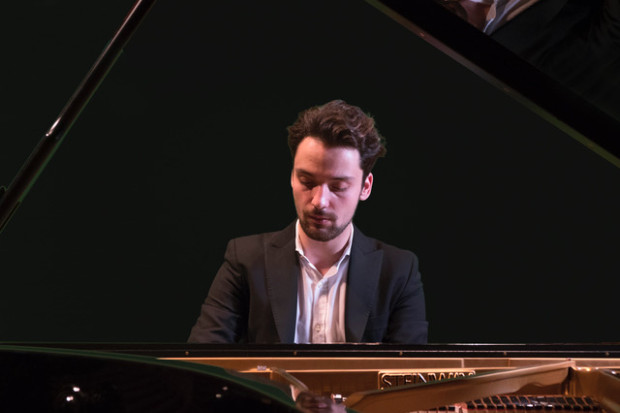
Imogen Cooper Music Trust presents Cristian Sandrin, piano recital
Imogen Cooper Music Trust presents Cristian Sandrin in a performance of J.S. Bach's monumental Goldberg Variations live from 30 Pavilion Road, Knightsbridge.
The broadcast will begin on 20th Jun 2021 4:00pm (BST) with on-demand video available for 14 days after the show.
About Cristian Sandrin
A former scholarship holder of the Imogen Cooper Music Trust, Cristian Sandrin was born in 1993 into a family of musicians in Bucharest, Romania.
He began his musical training at the Dinu Lipatti National College of Arts, making his debut as a soloist at the famous Romanian Athenaeum in 2006. He completed seven years of studies at the Royal Academy of Music (RAM), London, in 2019 having gained a DipRAM distinction, an MA (Master of Music) and the Advanced Diploma in Performance, reserved for only the very best students.
In London Cristian made a well-received debut solo recital at the Wigmore Hall in 2017 and from 2018 to 2020 toured extensively across the UK as an artist with the Countess of Munster Recital Scheme. In Romania he is a frequent guest artist with the leading orchestra, most recently having performed Mozart's Piano Concerto K503 with "George Enescu' Philharmonic in 2021.
A keen chamber musician who enjoys directing ensembles from the keyboard, Cristian has made frequent appearances at the prestigious Romanian SoNoRo international chamber music festival. Other international engagements include performances at the Sala Manuel de Falla Madrid, La Fenice Venice, the Salle Cortot Paris, and the Polish National Concert Hall Warsaw. Cristian has been a prizewinner in numerous national and international piano competitions, most recently being awarded the Rosalyn Tureck Special Prize for the best interpretation of Bach at the 2019 Olga Kern International Piano Competition in Albuquerque, New Mexico, USA. He took advantage of the 2020 covid-19 lockdowns to concentrate on learning the Goldberg Variations, which he describes as 'an extraordinary companion' at a time when he was both isolated and also free from the pressure of impending concerts and competitions.
The programme
Johann Sebastian BACH (1685–1750) The Goldberg Variations BWV 988 (1741)
J.S. Bach was born in Eisenach, Saxony, in present-day north Germany. His father and all his uncles were professional musicians so the boy was steeped in the works of the great composers and trained to achieve high standards of performance. Not that the family's dedication to music was entirely solemn. The Bach household was well known for its reunions with bawdy sing-songs and boistrous, impromptu music-making.
Bach composed the Goldberg Variations BWV988 in 1741 at the height of his fame when he was living in Leipzig and employed by the royal court of Poland and the electoral court of Saxony as well as being Kapellmeister and Director of Choral Music in the city. The Variations were commissioned by Count von Keyserling, the Russian ambassador to the electoral court of Saxony, to be performed by his personal harpsichordist, a young virtuoso named Johann Gottlieb Goldberg. The unfortunate Count was an insomniac and Goldberg, who was in his service, was instructed to sleep in an anteroom and play music both calming and lively to cheer up his master's sleepless nights. Bach proposed the Variations and was handsomely rewarded for his efforts. Notoriously difficult to play, the work is regarded as a towering keyboard masterpiece.
Following an opening Aria there are 30 variations, some unhurried and serene as befits a lullaby and others exuberant and brilliant. The 30th variation is a Quodlibet, a traditional musical form combining a mixture of popular tunes. This light-hearted parting joke includes two folk songs whose titles translate as, 'I have so long been away from you, come closer, come closer' and 'Cabbage and turnips have driven me away, had my mother cooked meat, I'd have opted to stay'. The work ends sublimely with a note-by-note repeat of the opening Aria. Bach never lived or travelled beyond the land of his birth, yet his compositions are enjoyed and revered by music-lovers the world over.
Programme notes by Mary Orr









